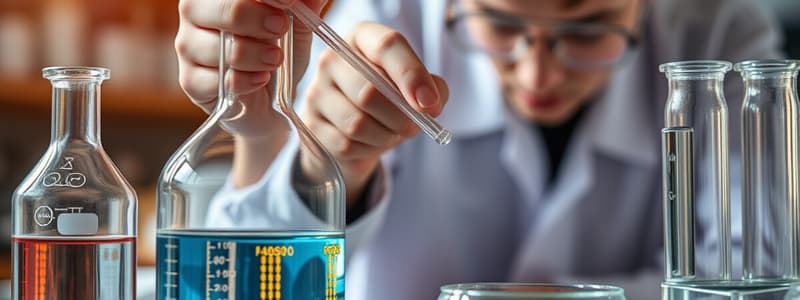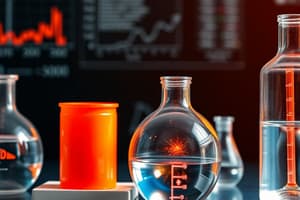Podcast
Questions and Answers
What is the correct definition of a prediction in the context of testing a hypothesis?
What is the correct definition of a prediction in the context of testing a hypothesis?
- A statement that tells what will happen under certain conditions (correct)
- A question that seeks to confirm the hypothesis
- A statement that outlines the purpose of the hypothesis
- A conclusion drawn from gathered evidence
In the statement 'If a moth has eye spots on its wings, then birds will avoid eating it', what part represents the independent variable?
In the statement 'If a moth has eye spots on its wings, then birds will avoid eating it', what part represents the independent variable?
- The avoidance behavior of birds
- The birds
- The eye spots on the wings (correct)
- The moths
When an experiment tests how one variable affects another, what is the variable that is affected called?
When an experiment tests how one variable affects another, what is the variable that is affected called?
- Dependent variable (correct)
- Confounding variable
- Control variable
- Independent variable
What is the role of a control group in an experiment?
What is the role of a control group in an experiment?
In a plant growth experiment using fertilizer, which plants would you classify as the experimental group?
In a plant growth experiment using fertilizer, which plants would you classify as the experimental group?
Why is it important to control other factors in an experiment?
Why is it important to control other factors in an experiment?
Which of the following statements correctly describes the relationship between independent and dependent variables?
Which of the following statements correctly describes the relationship between independent and dependent variables?
What causes experimental error in scientific experiments?
What causes experimental error in scientific experiments?
What is the significance of sample size in an experiment?
What is the significance of sample size in an experiment?
Why is repetition important in scientific experiments?
Why is repetition important in scientific experiments?
Which of the following scenarios illustrates the use of a natural experiment?
Which of the following scenarios illustrates the use of a natural experiment?
What can experimental error affect in scientific research?
What can experimental error affect in scientific research?
What factor is NOT controlled in a natural experiment?
What factor is NOT controlled in a natural experiment?
Which of the following is a potential consequence of using a small sample size?
Which of the following is a potential consequence of using a small sample size?
What is one approach to reduce the effects of experimental error?
What is one approach to reduce the effects of experimental error?
Flashcards are hidden until you start studying
Study Notes
Testing the Hypothesis
- A hypothesis leads to a prediction formulated as "If A occurs, then B will happen".
- Example prediction: If a moth has eye spots on its wings, then birds will avoid eating it.
- Evidence is gathered through observations to support or disprove the prediction.
Variables in Experiments
- Experiments examine how one variable (independent) affects another (dependent).
- Dependent variable example: plant growth.
- Independent variable example: amount of fertilizer applied to plants.
- Control group does not receive treatment from the independent variable.
- Control group is essential for comparing experimental results.
- Other factors affecting the dependent variable must be controlled to ensure valid results.
Sample Size and Repetition
- Sample size influences reliability of experimental results; larger samples yield more accurate insights.
- Repetition of experiments enhances validity; consistent results across trials strengthen conclusions.
Experimental Error
- Human and equipment errors can lead to experimental error, affecting measurement accuracy.
- Equipment may have systematic errors (e.g., a scale measuring heavy).
- Human error can occur in timing or observation.
- Multiple measurements are taken and averaged to reduce skewed results, accounting for margin of error.
Natural Experiments
- Natural experiments occur in uncontrolled environments where variables cannot be manipulated.
- Common in fields like astronomy and meteorology where ethical concerns or practical limitations exist for controlled experiments.
- Researchers observe multiple variables consistently to understand their effects on the system studied.
- Natural experiments are used when controlled testing is unethical, such as studying fetal alcohol syndrome effects.
Studying That Suits You
Use AI to generate personalized quizzes and flashcards to suit your learning preferences.




